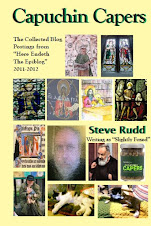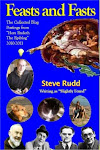It has been a busy week in the Holme Valley.
Summer continues, much to the delight of all concerned in our small household
of two humans and a variable number of animals. It being half term, and very
much the “eye” in the hurricane that is the exam season, we were hoping to get
away in the camper van for a few days, even if only to Walney, to see the
seaside, the seals and the sea, but – unfortunately, from a timing point of
view – something sharp in the road which Debbie encountered on Monday took out
two of the tyres, and also bent the rear wheel arch plate. The scary thing is Deb has no recollection of
hitting anything, but that is what happened, according to the garage. Two new tyres and a bit of metal-bashing
later, we got the van back from the garage on Thursday. But by then it was a bit too late in the week to be
loading up. I'm not quite sure why it took so long to repair. Lewis Hamilton's car gets its tyres changed in about 15 seconds.
Still, Misty and Zak have been enjoying their walks,
although not the runs, which Debbie has taken to doing on alternate days.
Yesterday they did five and a half miles. Misty kept stopping in protest, and
Zak, at 65 in human years, was loping along, doing the best he could to keep
up. When they got back, they demolished
the water bowl plus several refills between them.
Matilda has not been running anywhere. In the manner of cats
the world over, her reaction to sunshine is to find the warmest and sunniest
spot on the decking, curl up there, and go back to sleep. Then, later in the afternoon, when the sun
has moved around, she moves too, to the next sunniest spot, and so on. Eventually, when hunger overcomes the desire
for a warm sleeping-place, she plods in through the open door and takes up
station by her bowl, ready for another instalment in the never-ending buffet of her
life.
The birds and squirrels are still busy, but it looks like
Brenda has left us for another year, as we haven’t seen any sign of badger
activity for a few nights now. Still,
like many pleasant things, it was good while it lasted, and it’s comforting (to
me at any rate) to think of her nurturing a new generation of badger cubs in a
cool sett somewhere underground in the woods down the valley-slope.
I’ve not done nearly as much work as I should have done this
week. Unfortunately, this weather and work just don’t mix. I really must buckle
down to it next week and get some of these damn books off to press. Having four projects on the go at once, all
of which are almost finished, is currently doing my head in.
As is the continuing hoohah over the Brexit debate. It is
absolutely everywhere you turn, and, of course, it is The Grand Confusion writ
large, with lies and questionable statistics being bandied about on both sides.
One reason why, sadly, the Brexit
campaign is going to win this (by bamboozling people who already have racist
xenophobic tendencies and a warped view of the EU as an army of faceless
bureaucrats fond of straight bananas) is that Brexit even have the better lies.
The “Remain” campaign seems to be relying on an
ever-increasing number of statements by people of varying statuses, from
captains of industry, merchant bankers and the like, right down to questionable
celebrities no-one has heard of, to the effect that economically, we’d all be
worse off out of Europe. This is,
actually, probably true. More sober, realistic studies by people such as the
Bank of England and the IMF have said as much. But the serious, considered
nature of their analysis is lost in the noise of the hysterical scaremongering
employed by the Remain campaign, though they have toned it down a little of
late, as they have belatedly come to realise it was alienating people.
What they omit to mention, as well, is that the ecomony
isn’t going to sing and dance any time soon, even if we stay in. Six years of
misguided “austerity” have seen to that.
With the clown Osborne, the Chancer of the Exchequer, in charge, things
can go down as well as up. And probably will. With potentially four years to
the next election, Osborne still has a lot of missed targets to fail to try and
meet by yet more irresponsible plundering of the poorest and most
disadvantaged, so expect more of the same, if Remain wins, with a few sops
being thrown as election bribes in early 2020.
Brexit, however, have, as I said, outclassed the rather
dismal untruths of the Remain campaign by a country mile. Their “offer” as it might be described in
marketing terms, is based on three key issues.
Better use of “our” money than simply “giving” it to the EU, “regaining control” of immigration, and
returning “sovereignty” to the UK.
When you start to examine those in detail, however, they fall
apart. On the monetary front, the £350million a week has been shown to be, in
effect, more like £161million, which is still a tidy enough sum, but nowhere in
the Brexit “Ladybird Book of EU Economics” is there a chapter on EU regional
development funding, EU emergency funds (such as the flood fund) and other
inward investment. The most fallacious
claim is that the money we “give” to the EU could be better spent on the NHS
and schools.
How likely is it, given the Tories’ appalling record on
investment in the public services, that this would actually happen? We are
talking, after all, of the people who disposed of Royal Mail at a below market
value, fire sale price, and now want to do the same to The Land Registry. To give you a clue, I posted a question on
Boorish Johnson’s Facebook Page, asking if, in the event of a Brexit win, David
Cameron resigning, and Johnson becoming prime minister, if he would commit here
and now to putting an extra £350million a week into the NHS. After all, it’s
plastered all over the Brexit literature.
I’m still waiting for an answer!
There won’t be a cash surplus anyway. Norway, which
trades with the EU although it is not a member, still has to pay in to the EU,
and also has to accept free movement of labour.
So in that case, nothing changes apart from we lose what limited
influence we have to shape policy from within the EU, and veto anything we
don’t like the look of. And if you think
we can instantly magic bilateral trade agreements with the rest of the world
outside of the EU, I also have some magic beans I can sell you if you’re
interested.
But the glaringly-obvious point, the
pike-staff-brandishing-elephant-in-the-room, is that, since we are not in the
Euro, we control our own money supply anyway, and if we wanted to spend £350million a week extra on the NHS, we could, right now, from tomorrow. That weasel
Osborne (sorry, weasels everywhere) only has to pick up the phone to Mark
Carney at the Bank of England, and tell him to start the presses running, and
jiffy bags full of £50 notes could be in the post to every hospital in the UK.
The issue on the free movement of people brings me on to
immigration. This is the area where Brexit are possibly being more untruthful
than any other. They are tapping into
the generally perceived idea which has been fostered by the Tories and UKIP
since 2010, that there are “too many” brown people in the UK, and that these
people are getting a disproportionate chare of state handouts and benefits
which are somehow denied to “white natives”, and that this is somehow
“swamping” our “native culture” because we are being forced to sing “baa baa
ethnic sheep” and not to wave the St George flag might offend Muslims. All
bunkum, of course, or at best, bunkum leavened with a tiny, homeopathic-sized
grain of truth.
I’ve paraphrased that slightly, but speak to any white van man or racist granny and that’s what you’ll hear. Usually from people who are incapable of differentiating between a refugee, an asylum seeker, an economic migrant, or a British citizen with a non-white ethnicity. I am hard on these people, but on the other hand, you can see how they got that way. Labour, their traditional homeland and the natural refuge of the white working class, has ignored them for about twenty years now, because people like Blair and Miliband thought the route to Westminster lay in wooing floating voters in the leafy shires of Middle England. Add to this a generous leavening of misguided “political correctness” and “positive discrimination”, each instance of which is eagerly proclaimed by a rabidly xenophobic press as evidence that the country is going to the dogs, and there you are. Mix them together, and what do you get, bippity boppity boo, as the song says. You can see the same thing happening in America, where white working class voters whose needs and concerns have been ignored by the college elite technocrats who have run for president in recent years, are now emerging en masse from the woodwork to do Nazi salutes at Trump rallies.
I’ve paraphrased that slightly, but speak to any white van man or racist granny and that’s what you’ll hear. Usually from people who are incapable of differentiating between a refugee, an asylum seeker, an economic migrant, or a British citizen with a non-white ethnicity. I am hard on these people, but on the other hand, you can see how they got that way. Labour, their traditional homeland and the natural refuge of the white working class, has ignored them for about twenty years now, because people like Blair and Miliband thought the route to Westminster lay in wooing floating voters in the leafy shires of Middle England. Add to this a generous leavening of misguided “political correctness” and “positive discrimination”, each instance of which is eagerly proclaimed by a rabidly xenophobic press as evidence that the country is going to the dogs, and there you are. Mix them together, and what do you get, bippity boppity boo, as the song says. You can see the same thing happening in America, where white working class voters whose needs and concerns have been ignored by the college elite technocrats who have run for president in recent years, are now emerging en masse from the woodwork to do Nazi salutes at Trump rallies.
Brexit have been playing on these fears with the touch of a
master pianist stroking the ivories of the best Steinway. They rarely, if ever,
point out the difference between EU and non-EU immigration, and they never
pause to consider the knock-on effect it would have on the thousands of Britons
working and living in Europe, if we were in
effect to fill in the tunnel and pull up the drawbridge. This attempt to tap
into anti-Muslim sentiment is what is behind the Brexit campaign harping on
about Turkey joining the EU,
even though Turkey
has only currently met one or two of the conditions for joining. They are
singing a siren song to people who don’t want brown neighbours, and trying to
wind the clock back to the 1950s in terms of racial and religious tolerance. In that respect alone, a Brexit victory would
have very bad implications for racial cohesion and harmony in UK society. Meanwhile, the refugees drowning in the Mediterranean continue to go un-named and un-mourned.
On the employment front, Brexit really don’t care if a
British software engineer in Dusseldorf has to
up sticks and move back to the UK
to pick sprouts on a Lincolnshire
farm for minimum wage, because all the Poles and Romanians have been sent home,
post-Brexit. In fact, I doubt they have even thought it through. Too rigorous
an analysis would, after all, destroy the argument itself, once you start weighing
losses and gains. Let’s be charitable
and assume they are just being stupid, though someone more cynical than myself
could possibly conclude that they are wilfully not bothering to tell the full
story, in order to tap into incipient racism in some sections of the
electorate.
When it comes to sovereignty, I already wrote last week
about the way in which Johnson is deliberately confusing the European Court of
Justice and the European Court of Human Rights, and quoted at length from
Professor Adam Tonkin about the way in which sovereignty actually works, by
mutual consent. This analysis of the situation is totally drowned out by the
blaring and trumpeting coming from the Brexit camp about “taking back control”
– of something we already had anyway – and once again, unless something is done
to scotch this falsehood that, post-Brexit, the UK would be somehow more in
control of its own laws and destiny, when in reality the situation would be
pretty much the same as now, or maybe worse, in terms of some of the positive
things the EU has brought to us no longer applying, such as employment law and
health and safety, then Brexit will win, and win comfortably, something which
we will all come to regret. Mark my words.
Boorish Johnson was singled out especially for attention by
no less a personage than Sir John Major this week – our oldest living ex prime
minister, who knows a bit about European arguments. Major called Johnson a
“court jester” and said that leaving the NHS in his care, and the care of the
other Brexiteers, was like leaving a python to look after your pet
hamster. This was quite severe for John
Major, whose previous most extreme remark was to call people who disagreed with
him over Europe “bastards”, but despite his bluster, Johnson must be concerned
that both Major and Heseltine, who still represent a considerable faction
within the Tories, have now both given him the savaged-by-a-dead-sheep
treatment, and will no doubt be queuing up to wield the lead-filled sock in the
event of a contest to decide, post-Cameron, who will lead the Tories in the
four years to the next election.
When I said, “there are four years to the next election”,
that is, of course, unless the continuing rumblings about the 2015 Election
expenditure on the Tory campaign do actually manifest themselves in
prosecutions. It is a story which is not going to go away. It can only get
bigger, and if the result is that the 2015 Tory wins in the affected
constituencies have to be set aside and the government falls, then so be it. In the last big financial scandal to hit the
political establishment, the one over MPs’ expenses, Labour MPs who had
transgressed generally received harsher punishments, including jail in some
cases, whereas Tories generally got off scot-free, or with a rap over the
knuckles. This latest, episode, for me, goes some way to redressing that
imbalance of justice. If it turns out
that the 2015 Election was actually null and void, because of unlawful expenses
costs, though, quite where that leaves the authenticity of the EU referendum,
which would have been called by a government acting unconstitutionally, is
anyone’s guess!
St Boniface, whose feast day it is today, was originally
known as Wynfrith, Winifrith, or Winfrith, and was born in the (then)
Anglo-Saxon kingdom
of Wessex in about 675AD.
He was a leading figure in the Christian
evangelisation of what is now Germany,
and was then “Germania” in the 8th
Century. Considering the era in which he
lived, his life is actually one of the better-documented ones of saints of the
period, though of course not all sources agree. For instance, the place of his
birth, supposedly Crediton in Devon, is only
given in one source. He is supposed to
have studied at an abbey in Exeter,
under Abbot Wulfhard.
Although he apparently lobbied hard to be allowed to be a
missionary, it was not until about 714AD that he was able to depart on his
first trip, to Frisia, to aid St Willibrord, who had already been over there
for some time attempting to turn people to Christianity. Winifrith had moved on from Exeter
to a monastic institution at Nursling, near to Winchester. When the old abbot of Nursling
died, it was sort of expected that Winifrith might take on the post. Instead he
set off on his first mission. It’s all
in the timing, though. Winifrith arrived at Utrecht just as the Frisian king, the
splendidly-named Radbod, had declared a war on the Christians, destroying
monasteries, scattering communities, and forcing them into hiding. Willibrord was heading the other way, back home
or into exile, and within a few months, Winifrith had no option but to join
him.
Back again at Nursling, Winifrith took some time to regroup
and re-think, and decided that he would go to Rome first, before doing any more
abortive missions, and get the blessing of the Pope. His idea was that then, he could claim that
any future missions he instigated had the backing of the papacy. On meeting Pope Gregory II, Winifrith was
immediately renamed “Boniface” by the pontiff, after the legendary 4th-century
martyr Boniface of Tarsus. It wasn’t
really the done thing to object, so from that day forth, Boniface he
became. Apart from unexpectedly
acquiring a new name, the rest of his plan went well. The Pope appointed him
the first bishop of Thuringia, conveniently overlooking
that there was actually no organised Christian church in that region, and
Boniface set off on May 15, 719AD.
It was in Thuringia that
one of the most well-known incidents in the life of St Boniface took place, the
chopping down of the Donar Oak. This was obviously some kind of sacred tree,
possibly dedicated to Thor (“Donner” is the German word for thunder) and associated
with non-Christian worship in the area. A confrontation developed when Boniface
attempted to intervene in a sacrifice taking place. The story goes that he used
his bishop’s crook to block the downward blow of the sword, and instead of
cleaving straight through, the sword shattered on impact. Then Boniface began
to attempt to chop down the tree and a great wind sprang up and felled it for
him, without any further blows. The tree
fell in four pieces, in the shape of a cross. These tales were obviously puffed
up by Boniface’s many hagiographers, and if such a confrontation did happen, it
may well have been stage-managed to ensure a victory for Boniface.
While he continued under the protection of the Frankish
kings, who took the side of the Christians in their conflict with the Saxons, he
was able to get on with establishing monastic foundations, and returned to Rome twice, once in 732
and once in 737. In 742, he was
instrumental in the founding of the abbey at Fulda, with which he remained closely
associated for the remainder of his life.
At the age of 73, when most people would probably be thinking of
downsizing and taking it easy, St
Boniface set off on his final mission, to have another crack at converting the
Frisians. Unfortunately for Boniface, a meeting he had summoned, on 5th
June 754AD, for the purposes of converting people to Christianity, turned into
a bloodbath when a band of armed robbers appeared and slew Boniface and his
entire entourage. Some accounts claim
that Boniface ordered his retinue to surrender, shouting "Cease fighting.
Lay down your arms, for we are told in Scripture not to render evil for good
but to overcome evil by good."
After travelling around a bit, post-mortem, via Mainz and Utrecht,
Boniface’s remains eventually found their way back to Fulda, where they were interred. Also
returned to Fulda, and kept there as a relic, was the Ragyndrudis Codex, one of
three books found on the field of battle after the saint’s death, which
supposedly belonged to him, and which is marked by the cuts of sword or axe
blades which may actually have been inflicted on it during the saint's martyrdom.
A cult quickly sprung up around the abbey, no doubt
encouraged by the monks: saints were good for business! Miracles were also reported. A particular
visitor’s horse became stuck in some mud at the site of Boniface’s martyrdom,
and when its hoof was pulled out, a fountain immediately sprang up there. A church
was later built on the site, at Dokkum. There are several dedications to St
Boniface in UK churches,
notably a catholic church of that name in Crediton, near Exeter, his supposed birthplace.
He also left a legacy in the form of approximately 150
letters, though not all of them are attributable to him, as he was a prolific
correspondent with other notable figures of his time and with the papacy, some sermons which are generally accepted to
have been written much later and simply attributed to him, and a latin grammar
of which there is an 8th-century handwritten copy in the state
archives of Marburg.
Ironically, because he was, after all, an Englishman, St
Boniface has occasionally been appropriated as a symbol of German unity and
nationalism. In 1954, the 1200th anniversary of his martyrdom, the
then German Chancellor, Conrad Adenauer, addressed a crowd of 60,000 celebrants
with the phrase “What we have in common in Europe
comes from the same source.” Quite
appropriate, given the current context.
I’m not sure what the lessons are from the life of St
Boniface. I’m not a great fan of people who proselytise their religion, and I
also quite like trees, so he sort of starts behind the line as far as I am
concerned. Converting – or trying to
convert – other people to your “one, true religion” has been the cause of a
massive amount of suffering and war, and still is. I much prefer my saints to be contemplatives,
hermits, who found their own way to God, and if they did convert anyone, it
would be by example. Also, don’t allow yourself to be appropriated by
nationalist movements after your death, I suppose. Although Adenauer was nowhere near as
damaging as some of his predecessors in
his desire to reunite Germany,
a certain A. Hitler to name but one.
The issue of a wider European unity is something that has
been sizzling on the hot plate for almost a century and a half, ever since France and Germany started the ding-dong that
became the Franco-Prussian War in 1870. In fact, you could say that even in the
dim and distant days of St Boniface, the wars between the Franks and the Saxons
were almost a precursor of later conflicts.
Hitler wanted to unite Europe for a thousand years, but of course the
extra bit in his plan was that he
wanted it to be called “Germany”.
We should not forget that 72 years ago on D-Day, the morning of 6th
June 1944, thousands of young lives were lost in the first decisive step
towards dismantling Hitler’s idea of Europe
and replacing it with something better.
The issue which we now have to decide, 72 years later, is whether that
“something better”, originally intended mainly as a free trade agreement, has
grown too big for its boots, and, if so, what we should do about it.
Specifically, whether it is better to try and shape and influence its direction
from within, or to opt out and trust to luck in an uncertain world.
Next week involves a succession of “D-Days” for me. Not I
hope, ones involving actual shot and shell, but some of them involving early
starts and journeys which will have to be planned like a military operation,
possibly – if things go wrong - with a similar outcome, involving blood and
casualties. The government has finally
responded to my petition, which is now just shy of 12,000 signatures,
predictably with the line that “the existing legislation is sufficient”, which is exactly what I expected them to say. It isn’t, of course, that’s the entire premise of the petition and why
I started it in the first place, and I am sorry, government, but no amount of
saying it is will make it so. I am probably going to do a one-off separate blog
post, giving my response to the response, when I get chance. Somewhere along the line (well, Tuesday
afternoon, actually) I also have to fit in a health appointment which I had to
cancel previously because my wheelchair wheel started collapsing. At least my
thumb has quietened down a bit, though it’s still not right and gives me
twinges of pain occasionally.
So, it’s already the start of June, and May has gone for
another year. The garden is lush, the plants on the decking look excellent in
all their finery, and soon it will be the end of term and we will be thinking
of heading off in the direction of Arran. Soon, in fact, it will be Midsummer, and the
days will start to decline, imperceptibly at first, but then progressively
shorter and darker as we journey on, this time into an uncertain winter. I’m amazed how quickly this year has gone.
They say that one of the symptoms of getting older is that your last few years
seem to fly by. That, and the policemen getting younger. Sadly, I have been
back-sliding as far as praying goes; I haven’t done much lately. But I have a
feeling that I am going to need an unseen ally at my side in the many
challenges of the crucial few days ahead, and therefore I might just, once I
finish typing this, see if I can get in touch, and leave a feeble message on
God’s voicemail. And after that, we
might, when Deb returns with the dogs, have our tea outside on the decking, for
the first time in two or three summers. Who knows, next week, Jersey Plants
“Direct” might finally deliver my roses.



















No comments:
Post a Comment